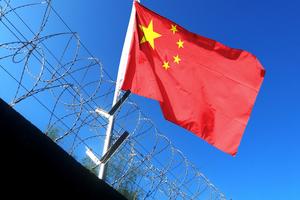Former Governor of Hong Kong Criticizes Vatican-China Agreement
Lord Christopher Patten spoke to the BBC shortly after the Vatican announced it had renewed for a second time its contested agreement with Beijing on the appointment of bishops in the communist country.

VATICAN CITY — Lord Christopher Patten, the last governor of the former British colony Hong Kong, has joined others in criticizing the Vatican for its dealings with the People’s Republic of China, saying the Vatican is guilty of “self-delusion” and should make public its recently renewed provisional agreement with Beijing.
In an interview with BBC Radio 4’s Sunday program broadcast Oct. 30, Patten, who is Catholic, said the Vatican has been “guilty of what others have been guilty of in dealing with China, a degree of self-delusion.”
“They imagine that they are getting things out of China when China is getting an awful lot of things out of its interlocutor,” he said, and referred to Cardinal Joseph Zen Ze-kiun, the bishop emeritus of Hong Kong, who is currently standing trial in the China-administered territory for being a trustee of a humanitarian fund that helped pro-democracy protesters pay their legal fees.
Patten said Cardinal Zen, 90, “is a great and outspoken advocate for Christian belief in human rights and human dignity,” but he added that the Vatican “has been incredibly lily-livered in what it said about him.”
Despite the cardinal having the “best sort of Christian attitude to human rights,” the former Hong Kong governor said the Vatican has been “spectacularly careful in anything they’ve said about him.”
A trustee of the British Catholic magazine The Tablet, Patten said he is “a great supporter of most of what Pope Francis is trying to do, but I think the attitude to China and what he said recently about Ukraine are pretty unattractive.”
Patten, whom Pope Francis appointed as his media czar to advise him on reform of Vatican communications 2014-2016, was speaking to the BBC shortly after the Vatican had announced it had renewed for a second time its contested agreement with Beijing on the appointment of bishops in the communist country. The pact, first signed in 2018, will be up for renewal again in 2024.
A former U.K. government minister under Margaret Thatcher who negotiated the handover of the former British colony of Hong Kong to China in 1997, Patten told the BBC interviewer that the Vatican’s claim that it had retained ultimate veto over the appointment of bishops in China could not be believed, and that in order to clarify the situation the “easy thing to do is allow the Vatican simply to publish the agreement.”
But he said the Chinese Communist Party (CCP) would “never like that happening” because they are “thuggish dictators.” He also said the CCP cannot be relied upon to keep their word, “whatever that may be.”
“The fact of the matter is, we don't know exactly what it is,” Patten continued. “But, you know, the Vatican could put an end to a lot of this criticism if they would simply publish the deal and say what had been accomplished as a result of it so far.”
He pointed out that at least two bishops are in prison and many priests have been driven out of the priesthood because they won't sign a vow of loyalty to the Communist Party and are now “working as farmers or working in factories.”
“It's all pretty unclear, pretty muddy about what the Vatican actually got out of [the agreement],” Patten said.
Asked if he believed the Vatican had a policy of appeasement toward Beijing, he said “certainly, if not more.”
“When the Pope said, you know, you have to take a long-term view in China, well, that's a copout, frankly,” said Patten. “When things are wicked, when things which are done are wicked, we should call them out as wicked.”
The Church’s influence, he continued, should not be one of realpolitik — a system of politics that places pragmatism above moral considerations. “The Church's influence stems in speaking up for human rights and human dignity and decency in the treatment of individuals,” he said.
He also questioned why the Vatican is being silent about other CCP crimes against, not only Christians, but the Muslim Uyghurs in Xinjiang — atrocities that are being condemned by the United Nations. “If they can be denounced by the U.N., why aren't they denounced by the Catholic Church?” Patten asked.
“I think it's all pretty well, to be blunt, unsavory,” he said.
Another former U.K. government minister, Jacob Rees-Mogg, has also voiced criticisms.
In a recent interview with the London Daily Telegraph, the Catholic parliamentarian said, “The thing I’m most worried about is the Catholic Church’s relationship with China. I cannot understand why we are allowing the Chinese government to have any say in the appointment of bishops, at the same time as Cardinal Zen is being persecuted in Hong Kong.”
“I cannot think what the Holy See is thinking,” Rees-Mogg added.
















